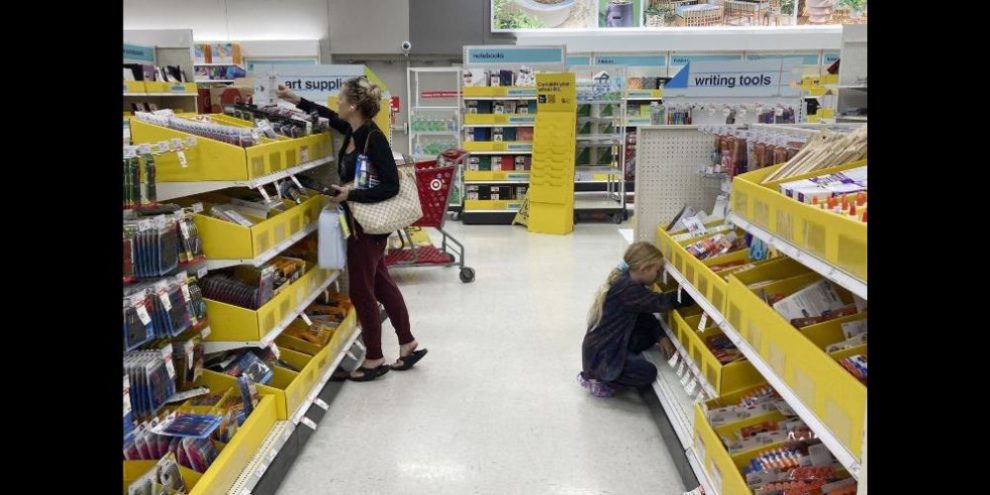
Toronto
The stationery aisles are expected to be busier this year as parents and students return to in-store shopping when stocking up on back-to-school essentials, though their baskets may be a little less full.
The annual shopping ritual comes as rising costs for food and housing squeeze optional spending plans for many households.
A survey by the Retail Council of Canada found that about 73.6 per cent of back-to-school shoppers plan to spend more than $50 this year, down from about 77 per cent last year.
And while last year shoppers planned to spend the most on clothing, books and music and electronics, this year stationery is expected to be the top spending category, with 61 per cent saying that's where they'll direct the biggest chunk of their school shopping dollars.
Last year stationery didn't even make it into the top 10 of categories in the survey, which polled more than 9,000 Canadian adults on Caddle Inc.'s mobile platform and online panel, which it says has a margin of error of one per cent or lower.
The results show that Canadians are being more cautious about spending, but still plan to buy what children need for school, said Michelle Wasylyshen, spokeswoman for the Retail Council.
“People are still spending ... they are being cautious, but they’re willing to spend when it matters.”
The survey also found that 81 per cent of shoppers plan to go to stores in person this year, a notable jump from the 41 per cent who said the same last year.
"The tradition of a family trip to the store to stock up on back-to-school supplies and fashions is back in full force," said Wasylyshen.
Other surveys show increasing strain from rising prices and the heightened interest rates the Bank of Canada is using to try and push inflation down.
In a questionnaire from NerdWallet Inc., 27 per cent of respondents said they would be buying fewer school supplies and more than half will be looking for sales.
The survey by Harris Poll of 303 Canadian adults, considered accurate within 6.4 per cent, found that shoppers plan to spend an average of $524 on back-to-school shopping.
NerdWallet personal finance expert Shannon Terrell said in a statement released with the data that it’s easy to overspend on back-to-school shopping, so it’s important to plan ahead to curb urges to splurge and keep in control of finances.
A separate survey from Capital One found that 45 per cent of Canadian households making less than $60,000 are foregoing essential items, and 80 per cent in this bracket are passing on nice-to-haves.
Overall, 57 per cent of respondents said thinking about how much they spend on their child or children stressed them out, with 64 per cent of women saying so and 49 per cent of men.
The results line up with what retail analyst Bruce Winder is expecting for this shopping season, and underlie the need for retailers to respond accordingly.
“They're going to buy less discretionary items and more essential items, so retailers will have fairly aggressive promotions."
While students may see some items as essential, parents may see otherwise this year, he said.
“Discretionary is, do you really need that extra top, do you really need that extra funky new pair of pants with rhinestones? You know, fashion type stuff.”
He said he expects more shoppers to look to dollar stores and online used sales, as well as looking to discount options like Shein and Temu, even if the fast-fashion clothing might not last as long or be so great for the environment.
“If you're sort of like most people who have to watch their money, then yeah, they're willing to forfeit a bit of quality in order to get to get through these times ... and they're probably willing, even though they don't like it, to put some of their environmental concerns aside as well," said Winder.
However, shoppers under pressure from general inflation might be pleasantly surprised by price trends in some key back-to-school items in recent years.
Children's clothing prices have gone down about 5.4 per cent in the past three years through to July 2023, while children's footwear has climbed just under six per cent.
School textbooks and supplies, which include pencil crayons, ballpoint pens, notebooks and other essentials, have gone up just under four per cent.
And electronics, which saw a surge in demand during the pandemic, have seen prices pull back notably, both from improvements in quality as well as changes in the sticker price. What Statistics Canada calls multipurpose digital devices have dropped about 21 per cent in the past three years.
But while some of these price trends could help, the overall inflation trend, combined with dwindling reserves of cash for Canadians, means that the so-far surprising strength of consumers is expected to weaken this season, said Winder.
"I think we're starting to see some of that taper off, just because there's too many headwinds."
This report by The Canadian Press was first published Aug. 23, 2023.
Banner image via The Canadian Press





